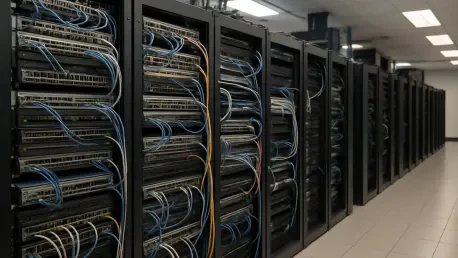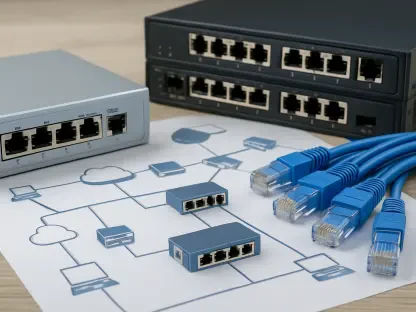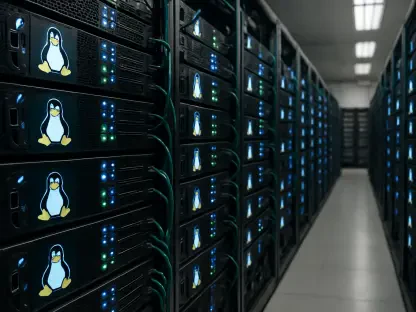The realm of data processing is witnessing a seismic shift with the emergence of edge intelligence servers, a development influencing the very fabric of numerous industries. Traditionally, data was processed in expansive centralized clouds, leading to challenges regarding latency, bandwidth, and security. However, the need for real-time analytics and decision-making has propelled these servers to the forefront, offering more efficient methods to handle vast swathes of information close to their origins. This burgeoning demand is fueled by the proliferation of Internet of Things (IoT) devices and applications, which generate massive data sets faster than traditional infrastructures can efficiently process. By decentralizing computing capabilities and delivering insights back to devices, these servers are not only optimizing data processing but are also enhancing the responsiveness and intelligence of various systems across multiple sectors.
Transformative Technological Drivers
The current technological advancements solidifying the role of edge intelligence servers as indispensable components in industry transformations are vast. Central to this revolution is the rollout of 5G networks, which have significantly heightened device connectivity, offering exceedingly faster data transfer rates. This synergy between 5G and edge computing ensures that data-intensive processes are no longer burdened by traditional cloud infrastructures. For industries that hinge on real-time operations, such as autonomous navigation and manufacturing, the ability to process data closer to its source is invaluable. This shift alleviates potential bottlenecks and reduces the load on central systems while harnessing the immediate power for rapid decision-making. Additionally, the growth of artificial intelligence (AI) and machine learning (ML) directly at the edge empowers industries by enabling refined and localized computationally demanding processes, ensuring the swift execution of tasks without relying on distant data centers.
As IoT ecosystems expand with an ever-growing array of connected devices, industries are witnessing a surge in data production demanding immediate attention and action. Edge intelligence servers are proving essential by bringing computational analysis to the data’s origin, enabling timely insights crucial for dynamic and data-centric applications. Moreover, the emphasis on data sovereignty and localized processing has become starkly apparent in sectors like healthcare and finance. Stringent regulations compelling entities to handle data securely and adhere to privacy standards necessitate localized processing, a task adeptly managed by edge servers. This localized approach not only aims to enhance data security but also mitigates the risks associated with widespread cloud interaction. Collectively, these technological drivers are not only revolutionizing the capability of edge intelligence servers but are also redefining operational frameworks in multiple industries, making them more adaptive and resilient.
Diverse Application Areas
The widespread adoption of edge intelligence servers is catalyzing a transformative change across diverse sectors, enhancing operational efficiency and innovation. In smart manufacturing, these servers are at the forefront, facilitating predictive maintenance, robotic automation, and advanced AI-driven inspection systems. They allow manufacturers to address potential malfunctions preemptively, optimize production processes, and ensure quality control, all in real time. This innovation reduces downtime, extends machine lifespan, and streamlines operational workflows, positioning industries at the height of efficiency and competitiveness.
Another pivotal area of application lies within the autonomous vehicle sector, where the necessity for rapid data processing and inference is paramount. Edge intelligence servers empower these vehicles with robust computational power crucial for autonomous navigation, obstacle detection, and real-time decision-making. By processing data at the edge, these systems attain instant responsiveness essential for safe and efficient operation in dynamic environments. In healthcare diagnostics, these servers enhance medical processes by enabling real-time analysis and quicker response times, proving crucial during life-critical scenarios. The ability to access and process patient data on-site allows for immediate diagnosis and treatment, significantly improving patient outcomes and operational efficiency in medical facilities.
Moreover, sectors like telecommunications and transportation, which demand low latency and real-time decision-making, greatly benefit from the capabilities of edge servers. With telecommunications networks leaning into the promises of 5G, integrating these servers optimizes bandwidth use and dovetails with emerging service demands. Similarly, in transportation, edge intelligence enables seamless operations, from real-time tracking and logistics management to infrastructure monitoring, enhancing safety and efficiency. Finally, defense and security sectors capitalize on localized, secure data handling offered by edge intelligence servers. By securely processing sensitive information at the data source, these applications ensure confidentiality and integrity while mitigating risks associated with centralized data exchanges. Each of these applications exemplifies how edge intelligence is reshaping conventional processes, offering industries streamlined, intelligent, and dynamically adaptive solutions.
Current Trends and Opportunities
In the edge intelligence server market, emerging trends and opportunities are reshaping industry landscapes, driven by innovations in both hardware and software domains. The ongoing advancements in hardware involve the development of AI accelerators, edge GPUs, and sophisticated networking interfaces, all aimed at augmenting computational efficiency. These hardware innovations accommodate increasing demands for robust data processing platforms capable of handling complex algorithms at high speeds, offering industries newfound analytical prowess. Concurrently, software solutions are witnessing parallel growth, with the rise of edge orchestration platforms and containerized runtime environments ensuring streamlined operations and exceptional adaptability. This dual advancement in hardware and software forms a synergistic foundation that caters to evolving industry needs, fostering a conducive environment for implementing edge intelligence solutions.
The segmentation of the edge intelligence server market further reveals strategic opportunities for growth and adoption. As industries seek to harness these technological developments, the market is divided by component, deployment model, application, and region. Currently, hardware components reign supreme due to the pressing need for hardy server platforms capable of sustaining diverse and intensive applications. Furthermore, the inclination towards hybrid deployments reflects industries’ desire to merge on-premises capabilities with cloud-managed infrastructures. This hybrid approach affords enterprises the flexibility to tailor computing solutions that best suit their unique operational demands while ensuring a balance between localized processing and centralized resource management.
Regionally, distinctive insights reveal varying growth trends. North America, with its early adoption of AI, IoT, and 5G technologies, continues to lead the charge in technological innovation, spurred by strategic enterprise investments. In contrast, the Asia-Pacific region experiences the swiftest growth due to extensive digital infrastructure expansion and smart city initiatives, notably in nations like China, India, and South Korea. Europe, with its commitment to decentralized solutions, remains steadfast in capitalizing on edge computing for smart city enhancements and health care advancements, driven by stringent GDPR regulations. Furthermore, Latin America’s focus on telecommunications modernization and digital education is carving new opportunities in edge computing markets. Similarly, the Middle East and Africa, propelled by smart city projects in regions like the UAE and Saudi Arabia, are embracing edge technology as an integral part of modernizing urban landscapes. These trends and opportunities underscore not only the existing traction of edge intelligence servers but also hint at their potential to redefine technological ecosystems on a global scale.
Innovation and Impact of Key Market Players
A pivotal aspect of the edge intelligence server industry is the significant roles played by key market players in fostering innovation and integration. Companies like NVIDIA Corporation, Dell Technologies Inc., Hewlett Packard Enterprise (HPE), Cisco Systems, Inc., and IBM Corporation are leading the charge with groundbreaking enhancements that are transforming industries. NVIDIA, for instance, offers a spectrum of AI-accelerated edge computing solutions, including its Jetson and EGX servers, tailored for applications such as autonomous machines and sophisticated video analytics. These innovations are propelling sectors to new heights by providing robust computational frameworks necessary for modern data-driven environments.
Similarly, Dell Technologies is innovating with edge platforms resilient enough to withstand harsh environmental challenges while facilitating real-time industrial AI applications. These platforms are optimizing processes across various sectors, ensuring that industries harness maximum potential from their data resources. HPE, with its Edgeline Converged Edge Systems, converges compute, storage, and analytics to streamline industrial applications, advancing operational adaptability and intelligence. Concurrently, Cisco Systems is developing secure, AI-enabled edge nodes that integrate seamlessly with manufacturing client processes, bolstering the industry’s ability to manage and optimize complex production environments efficiently.
Moreover, IBM Corporation leverages its AI models and hybrid cloud platforms, adding significant enhancements to data-intensive edge applications. This integration allows industries to maximize efficiency while minimizing latency challenges and ensuring data security across sectors. Collectively, these organizations are not only driving innovation in hardware and software domains but are also setting benchmarks in edge intelligence solutions development. Their continuous endeavors highlight the crucial importance of collaboration and technology integration in addressing real-world challenges, enabling industries to stay at the forefront of technological advancements. Through their impactful contributions, these key market players underscore robust growth potential and opportunities for edge intelligence servers, heralding a new era in intelligent, decentralized computing.
Future Directions for Edge Intelligence Servers
Technological advancements have positioned edge intelligence servers as vital components in industry transformations, with the deployment of 5G networks playing a key role. The introduction of 5G has significantly boosted device connectivity and data transfer speeds, creating a powerful synergy with edge computing. This partnership eliminates the limitations posed by traditional cloud infrastructures in data-intensive operations. For industries relying on real-time processes, such as autonomous navigation and manufacturing, processing data closer to its source is critically important. This approach prevents bottlenecks and lightens the load on central systems while enabling quick decision-making.
As IoT ecosystems grow with an increasing number of connected devices, industries must deal with a surge in data production. Edge intelligence servers have become essential, allowing computational analysis at the data’s origin and ensuring timely insights for dynamic applications. Moreover, the focus on data sovereignty and localized processing has become crucial in sectors like healthcare and finance, where strict regulations demand secure data handling and privacy compliance. Edge servers efficiently manage localized processing, enhancing security and reducing the risks associated with broad cloud interactions. Together, these technological advancements are not just boosting the capability of edge intelligence servers but redefining operational frameworks, making industries more adaptive and resilient.









